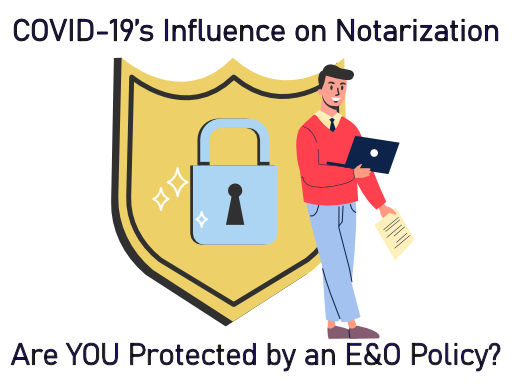Good advice bears repeating. Great advice deserves prompt action! Here is some of the best advice a notary can receive: protect yourself with a Notary Errors and Omissions (E&O) policy.

Good advice bears repeating. Great advice deserves prompt action! Here is some of the best advice a notary can receive: protect yourself with a Notary Errors and Omissions (E&O) policy.
Too many notaries confuse an Errors and Omissions policy with a surety bond (required in many states as a condition of obtaining a commission or appointment), yet they are entirely different products.
- A notary surety bond protects a notary’s customer by paying for financial losses—up to the bond’s limits—caused by a notary’s intentional misconduct or neglect in performance of a notarial act. A notary must pay back the surety company for every penny paid under the bond, and is responsible for all financial damages above the surety bond’s limits.
- A notary errors and omissions policy will protect the notary, up to the policy’s limits, if an unintentional error or oversight in performance of a notarial act causes harm to a customer. There is no deductible, nor is the notary required to pay back the E&O insurer for any claims paid.
If you’ve never considered purchasing an E&O policy, or you thought about it and chose to pass, it’s time to reassess—especially if any of the following circumstances applies to you:
- Your state has recently modernized its notary laws or administrative rules, perhaps changing or expanding which duties you may perform, how you perform them, whether you must keep records, or perhaps establishing additional prohibited acts.
- Your state has permanent laws authorizing remote online notarization (RON) for a remotely located individual, and you are performing or planning to perform such notarizations.
- Your state has addressed notarization safety concerns during the COVID-19 pandemic by temporarily authorizing a form of remote notarization commonly called “remote ink-signed notarization” (RIN), and you are performing or would perform such notarizations.
- Your state doesn’t require you to take initial or refresher notary training as a commission or appointment qualification.
Any of these circumstances affect what a notary considers the familiar “what and how” of performing a notarial act. Complicating that is the public’s urgent need during a pandemic to execute sensitive documents such as wills, powers of attorney and heath care directives before a notary; the public’s knowledge that RON and RIN are possible options; and a customer’s sometimes erroneous ideas and expectations about how RONs and RINs must be performed.
Customer complaints of notary error or even wrongdoing occur when expectations—correct or not—aren’t met. This has always been the case with traditional paper-based notarizations performed for a physically present principal signer, and could be even more so with RON or RIN transactions. All the more reason for a notary to ensure they have the protection that only an errors and omissions insurance policy provides.
Notary errors and omissions insurance protects YOU, and it’s very affordable. It’s also simple to obtain… just visit our Notary Supplies Shop today!
